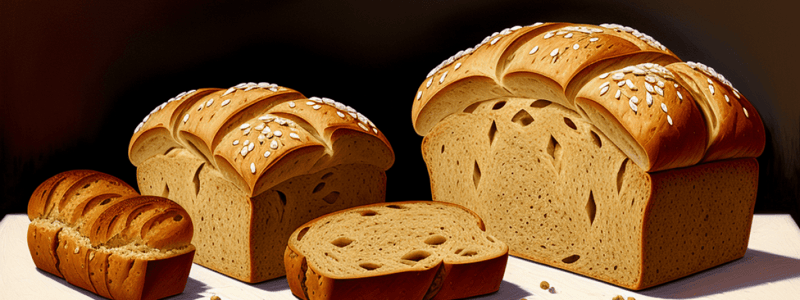Podcast
Questions and Answers
What is the main purpose of baking?
What is the main purpose of baking?
- To produce a hybrid barbecue
- To add food additives to enhance flavor
- To cook food using dry heat (correct)
- To create a paste-like mixture
What are some examples of foods that can be baked?
What are some examples of foods that can be baked?
- Salads and sandwiches
- Burgers and fries
- Sushi and sashimi
- Bread and cakes (correct)
What is the Maillard reaction?
What is the Maillard reaction?
- The use of food additives to enhance freshness
- The process of combining baking with grilling
- The process of cooking a paste-like mixture on a flat, hot rock
- The browning of the food's outer surfaces due to the caramelization of sugars (correct)
What is the significance of bread in religious traditions?
What is the significance of bread in religious traditions?
What is the significance of the city of Bethlehem in Christianity?
What is the significance of the city of Bethlehem in Christianity?
What is the significance of challah bread in Jewish tradition?
What is the significance of challah bread in Jewish tradition?
What is the significance of bread in Islamic tradition?
What is the significance of bread in Islamic tradition?
What is the significance of bread in Buddhist tradition?
What is the significance of bread in Buddhist tradition?
What is the significance of freshness in baking?
What is the significance of freshness in baking?
Flashcards are hidden until you start studying
Study Notes
The process of baking involves using dry heat to cook food in an oven, hot ashes, or on hot stones, and can be combined with grilling to produce a hybrid barbecue. Baking is an important skill for nutrition, as baked goods are a common and important food. Foods that can be baked include bread, cakes, pastries, pies, tarts, quiches, cookies, scones, crackers, pretzels, and more. Meat, poultry, game, fish, or vegetables can be prepared by baking en croûte, and eggs can be used to produce savory or sweet dishes. Baking has been practiced since ancient times, with the earliest known form of baking involving cooking a paste-like mixture on a flat, hot rock. Baking became a commercial industry in the 19th century, using automated machinery. The aroma and texture of baked goods as they come out of the oven are strongly appealing but quickly lost, and freshness is an important quality that is often compensated for by food additives. Baking requires an enclosed space for heating, typically in an oven, and the process involves eleven events that occur concurrently, including the browning of the food's outer surfaces due to the caramelization of sugars and the Maillard reaction. Baking, especially of bread, holds special significance for many cultures, and is an essential component of religious and ritual practices for Jews and Christians.The Symbolism of Bread in Religious Traditions
- Bread is significant in many religious traditions, including Christianity and Roman Catholicism.
- The term "Grace" is associated with "bread of the strong" and preaching, while religious teaching is referred to as the "bread of the word of God".
- In Roman Catholicism, a piece of blessed wax encased in a reliquary is considered the "sacred bread".
- The city of Bethlehem, whose name means "house of bread" in Hebrew, is believed to hold significance for Christians, as it is the birthplace of Jesus before he moved to Nazareth.
- Bread is often used as a symbol of sacrifice in religious traditions, particularly in Christianity, where it represents the body of Christ in the Eucharist.
- The use of bread in religious ceremonies dates back to ancient times, with evidence of bread offerings found in Egyptian and Greek cultures.
- The symbolism of bread in religion extends beyond Christianity and Roman Catholicism, with bread being a key element in Jewish, Islamic, and Buddhist traditions.
- In Jewish tradition, the challah bread is braided and eaten on the Sabbath as a reminder of the manna that God provided to the Israelites in the desert.
- In Islamic tradition, bread is seen as a gift from God and is often given to the poor as a form of charity.
- In Buddhist tradition, bread represents the middle path, a balance between excess and deprivation.
- The symbolism of bread in religion serves to remind believers of the importance of sustenance, sacrifice, and spiritual nourishment.
- The significance of bread in religious traditions has also influenced culinary traditions, with bread being a staple food in many cultures around the world.
Studying That Suits You
Use AI to generate personalized quizzes and flashcards to suit your learning preferences.




